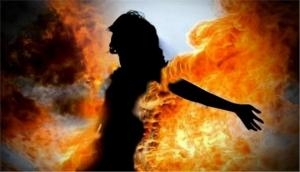
As journalists, we often need to speak of things we have read about, repeatedly, but cannot genuinely internalise. And possibly never will.
The Kashmir conflict is one such reality.
The people of Kashmir do not deserve the shock and horror experienced by a person writing about them miles away, seated in a cushy chair, painfully safe, and thereby ignorant. The people of Kashmir will tell you upfront, as my colleague Sehar Qazi did, "You will never understand. You were not born into conflict yourself."
My concern then is, should we be allowed to write? "Yes, you can write," says Sehar benignly, adding, "And yes, you shouldn't be disturbed. You haven't lived it."
Garrisoned Minds, a book edited by Laxmi Murthy and Mitu Varma, carefully divides its subject into four parts based on geography, and talks about the issues women face in conflict areas. We travel from Pakistan, to Nepal, to Kashmir and finally Northeast India, reading essays from journalists who have mapped these regions through their struggles. Especially, the struggles of their women.
Also read - Challenges of conflict: Women breaking free of fear in Northeast India
This article will focus on Kashmir and its women. Women who have realised the threat to their lives and bodies, and expect violence around the next street corner.
The essays titled Widowhood of Shame by Shazia Yousuf and Shadows of a Dark Night by Zahid Rafiq juxtapose different realities of Kashmiri women - different in their politics, harrowingly similar in action - often depending on the lives their spouses choose for them.
An Ikhwani widow
In Widowhood of Shame, we are introduced to Dilshada, a "widow of renegade" as she calls herself. Her husband was an Ikhwani - an ex-militant who turned spy for the Indian government in the early '90s. He would help lead Indian Army soldiers to find militant hideouts and, in turn, would be rewarded with a monthly stipend. This amount earned by Ikhwanis for outing and killing people from their own communities could range from Rs 3000 to Rs 10000 per month.
"They were also allowed to keep the weapons they had possessed as militants. This meant that several thousand armed men were let loose to unleash terror on unarmed civilians... supported by the Indian Army, which never took responsibility for their misdeeds," writes Shazia Yousuf.
Dilshada has a bullet lodged in her ribcage. She carries the pain in memory of her husband who brought this fate upon her. Despite Dilshada's repeated attempts to convince her husband Dar to cease being an Ikhwani, he never did. The bullet is a reminder of the day he was killed and she, for being his wife, was shot at.
She is isolated. Her family doesn't support her. Society doesn't accept her. She needs to live as a turncoat's widow, a reality that makes her wonder if she'd rather be a militant's widow instead.
Perhaps, she thinks, if Dar had died a martyr, Dilshada would have had a community that supported her, a family that helped raise her children, and a society that respected her. This is reflective of the complete rejection of the woman's personhood, as she is identified solely in association with her spouse, a situation that gets far more precarious in conflict.
Before her husband's death, Dilshada lost her youngest brother Bashir Ahmad Wani to revenge. Revenge for Dar killing someone who Dilshada's family probably didn't even know.
The isolation gets worse when her own family rejects her. As a married woman, she is seen as the property of the perpetrator, a shadow of the violence that ruined her family.
"At her father's house, Dilshada was not received as Bashir's sister but as the wife of his killer. Some cursed her, some spat and some held her by the arm and forced her to leave," writes Yousuf.
Dilshada's isolation, though entirely unfair, has become her only saviour. Or so she sees it. Widows of Ikhwanis are forgotten by the government, quickly discarded, they're the embarrassing remnants of records that are better wiped clean.
And therefore, Dilshada embraces this invisibility and the bullet, both reminders of a life she never wanted, but could never reject.
"As soon as dusk falls, I ask my children to draw the curtains and sit quiet. I think I don't want to see anyone. I don't want anyone to see us," she tells Yousuf.
Lost joys of marriage
Zareefa Akhtar loved her husband Noor-ud-din. But their romance took a tragic turn when he decided to turn Ikhwani.
In Widowhood, we learn that Noor-ud-din, a loving husband, turned informer and was killed for it soon after. On 19 March 1997, he was taken aside for a 'few questions' and his body was found in a nearby field the next day.
Khurram Parvez, Programme Coordinator of the Jammu and Kasmir Coalition of Civil Society (JKCCS), suggests that Noor-ud-din could have been killed by Indian soldiers, the same people he was aiding.
"We are following a case where more than fifteen Ikhwanis got disappeared at the hands of the Indian Army who used them for an anti-militant operation and disposed them off once their job was done," Parvez tells Yousuf.
But while Noor-ud-din lost his life for his decisions, his wife Zareefa lost her future to his death. Her in-laws married her off to Noor's younger brother Ali Mohammad, a boy she previously saw as her son. She has a son from this loveless marriage, a child pampered with privilege, while her sons from her earlier marriage must earn to study.
Again, Zareefa has no right to make decisions for her own children. She must let her fate, based on hasty decisions made by the men in her life, guide her future.
In another chapter, we're introduced to an older widow, Zooni. She remembers feeling inconsolable grief from when her Ikhwani husband was killed and thrown into a lake. She also remembers the exhaustion after.
The essay takes a poignant turn when the boatman transporting Shazia Yousuf enquires why she met Zooni. He then tells her that Zooni's husband killed his mother for rejecting his sexual advances. That he "beheaded her with an axe".
There is no justice for these women. Their men choose their politics, politics that they may fervently reject, but only within the closed walls of their homes. Walls that can easily collapse when their men die.
Rape, a weapon of war
In Shadows of a Dark Night, Zahid Rafiq meets and narrates the conversation he has with a family allegedly torn apart by the Indian Army. All the names have been changed by Rafiq to protect their identities.
Farida and her sister Nasreen are both married. While the former's husband is a militant who hasn't bothered to see her for years and has now married another, the latter has what one would call a normal marriage, except she loses her mind a few days every month.
Nasreen appears to be suffering from acute untreated PTSD from a night years ago when she was barely 14 years old. Farida's husband's militancy ensured regular checks at their home. Though she lived with her father, the old man was questioned about his absconding son-in-law by the soldiers, allegedly often violently.
On the night of 3 January 1997, Farida's father was beaten up and dragged away for questioning. Their mother fled to a nearby mosque while the children were safely at a relative's. But Farida and Nasreen were at the receiving end of the savage anger of a certain Major Arora.
Nasreen and her, Farida recounts, were beaten and violently raped by drunken soldiers including Major Arora. After they left, the girls huddled together before fleeing the house. The men apparently returned to look for them and disappointed at their absence, burned their house down.
"Armed with guns, shielded by impunity and with almost absolute control over life and death in the Kashmir valley, Indian soldiers were accused of sexual violence and rapes soon after the armed rebellion started," writes Rafiq.
He then shares evidence that continues to be overlooked. "In a 1993 report by the Human Rights Watch (HRW), the researchers came across fifteen cases of rape, twelve of which occurred during the week they were in Kashmir, giving an idea about the magnitude of rape as a weapon of war used by Indian soldiers."
Not only do the victims get pulled into violence that they never partook in, but they also have no systems for redressal, no support system, no place where they can be heard.
The atrocities of the Kunan Poshpora mass rapes stand testimony to this. In February 1991, over 30 women from the villages Kunan and Poshpora were allegedly raped by the 4 Rajputana Rifles regiment while their men were taken away for an 'all night interrogation'.
These women, perhaps emboldened by their numbers, tried to seek justice. But both the system and the media failed them. In fact, a committee set up by the Press Council of India (PCI) rejected their medical reports as 'worthless' and having proved nothing. They further shamed these victims, thereby victimising them even more, by stating that "such abrasions are 'common among village folk in Kashmir'". This, of course, is a horrifying insinuation that Kashmiri 'village folk' are sexually deviant.
Parvez Imroz of JKCCS considers rape a 'standard operating procedure' due to AFSPA. "The Indian state allows its soldiers to rape Kashmiri women in the line of duty... Since they [the victims] understand that there can be no justice, almost everyone stays silent," Imroz tells Rafiq.
And when they do speak up, it is almost too easy to silence them.
But what really rankles with these women in conflict is how their death or rape is never considered significant. How, by the virtue of being female, their entire existence is nullified, that is unless their bodies are used to exert violence.
As an angry Kunan-Poshpora mass-rape survivor asks, "When someone [a man] was killed by the soldiers, we all called them martyrs... Why then were we not seen as martyrs?"
First published: 11 September 2016, 12:47 IST







![BJP's Kapil Mishra recreates Shankar Mahadevan’s ‘Breathless’ song to highlight Delhi pollution [WATCH] BJP's Kapil Mishra recreates Shankar Mahadevan’s ‘Breathless’ song to highlight Delhi pollution [WATCH]](https://images.catchnews.com/upload/2022/11/03/kapil-mishra_240884_300x172.png)

![Anupam Kher shares pictures of his toned body on 67th birthday [MUST SEE] Anupam Kher shares pictures of his toned body on 67th birthday [MUST SEE]](https://images.catchnews.com/upload/2022/03/07/Anupam_kher_231145_300x172.jpg)






